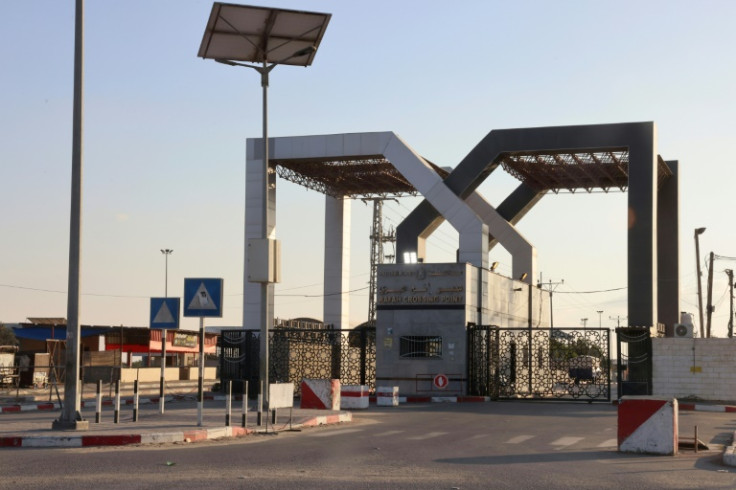Hamas Accused Of Stealing Aid While Second Convoy Crosses Into Gaza
The UNWRA accuse Hamas of stealing gasoline and medicine that was donated to Palestinian civilians as the Rafah crossing welcomes the second aid convoy into Gaza.

Last week, on Sunday 22 October, the United Nations (UN) announced that the second aid convoy had passed through the Rafah crossing and provided the millions of people trapped in Gaza with humanitarian aid.
On Saturday 21 October, the first convoy of 20 trucks crossed into Gaza from Egypt, and the second group of 20 trucks crossed the border on Sunday.
After Israel urged Palestinian nationals to flee the southern region of Gaza, for weeks, the Rafah crossing has remained closed, and a displacement crisis developed.
While Egypt refused to open the Rafah crossing to both civilians and humanitarian aid, the people trapped in Gaza have been forced to witness the relentless retaliatory air strikes from Israel.
More than 4,600 Palestinians have reportedly been killed in the enclave, with more than a third of the victims being children.
Amongst the internally displaced people waiting at the crossing into Egypt, were US and British nationals who were also waiting to evacuate the Strip.
Food and clean water have also been running out in Gaza since Israel ordered a total blockade on the region.
Since 2017, tensions between Hamas, Israel and the West Bank have left Gazan civilians victim to an electricity crisis, with power usually operating for half the day.
With Israel's power lines being one of the two main sources of electricity in Gaza, the total blockade left Gazan civilians with just 25 per cent of their usual power amount.
While humanitarian aid trucks struggled to reach people in the South of Gaza, via Egypt, Human Rights Watch called for Israel to immediately "flick the switch for the water and electricity supply".
Tirana Hassan, the Executive Director of Human Rights Watch, declared: "There is no excuse for denying water, food, and medicine to Gaza's civilian population. It is cruel and contrary to international law."
Calling on Israel to restore power in the region, Hassan emphasised: "Israeli authorities need to act immediately... Lives are hanging in the balance."
Loaded with medical and food supplies
— 🇷🇺 Эсса Али 🆉 Essa Ali 🇦🇪 (@ESSA_A1I) October 23, 2023
A second convoy carrying humanitarian aid enters the Gaza Strip through the Rafah crossing
🇪🇬 🇵🇸 pic.twitter.com/KfwF0DatRZ
So far, more than 200 trucks have been positioned on the Egyptian side of the Rafah crossing and are currently waiting for approval to drive into Gaza.
The 200 trucks are expected to provide the millions of people in Gaza with around 3,000 tonnes of aid, but fears are mounting over Hamas seizing the products.
Last week, the United Nations Relief and Works Agency for Palestine Refugees (UNRWA) reported that Hamas had stolen the humanitarian supplies that were to be given to Palestinian civilians in Gaza.
UNWRA, which donates more than $1 billion to Palestinian causes each year, said that the essential supplies included fuel and medical items.
In a report, the UNWRA spoke of a group claiming to be Hamas Health Ministry officials, who used a truck to steal more than 20,000 tons of gasoline and medicine.
The gasoline was to be used to power sanitary water plants that would be used by almost one million Palestinians in Gaza.
Although the UNWRA deleted their statement shortly after, UN and Israeli officials confirmed that the theft had taken place.
Hillel Neuer, the Executive Director of United Nations Watch, declared: "We estimate 24,000 litres of fuel, that's enough to power water desalination plants for four days to provide water to hundreds of thousands of Palestinians."
"That was stolen by Hamas, this fuel they're going to use for their terrorist purposes," Neuer added.
Turkey, the United Arab Emirates, Qatar, Jordan and Tunisia have sent at least eight planes to El Arish International Airport in Egypt. Each plane has been packed with humanitarian aid.
India and Rwanda have also sent 16 tons of aid and medical and disaster relief to Gaza.
Despite the European Union tripling their assistance to civilians in Gaza, the authorities in Germany, Denmark and Sweden have temporarily halted their aid as a response to the Hamas attacks on Israeli nationals.
Last week, US President Joe Biden revealed that the US would be donating a huge $100 billion in aid to support both Israel and Palestine.
This week, UK Prime Minister Rishi Sunak announced that the UK has also committed to "providing an additional 20 million pounds of humanitarian aid to civilians in Gaza, more than doubling our previous support to the Palestinian people".
© Copyright IBTimes 2025. All rights reserved.






















